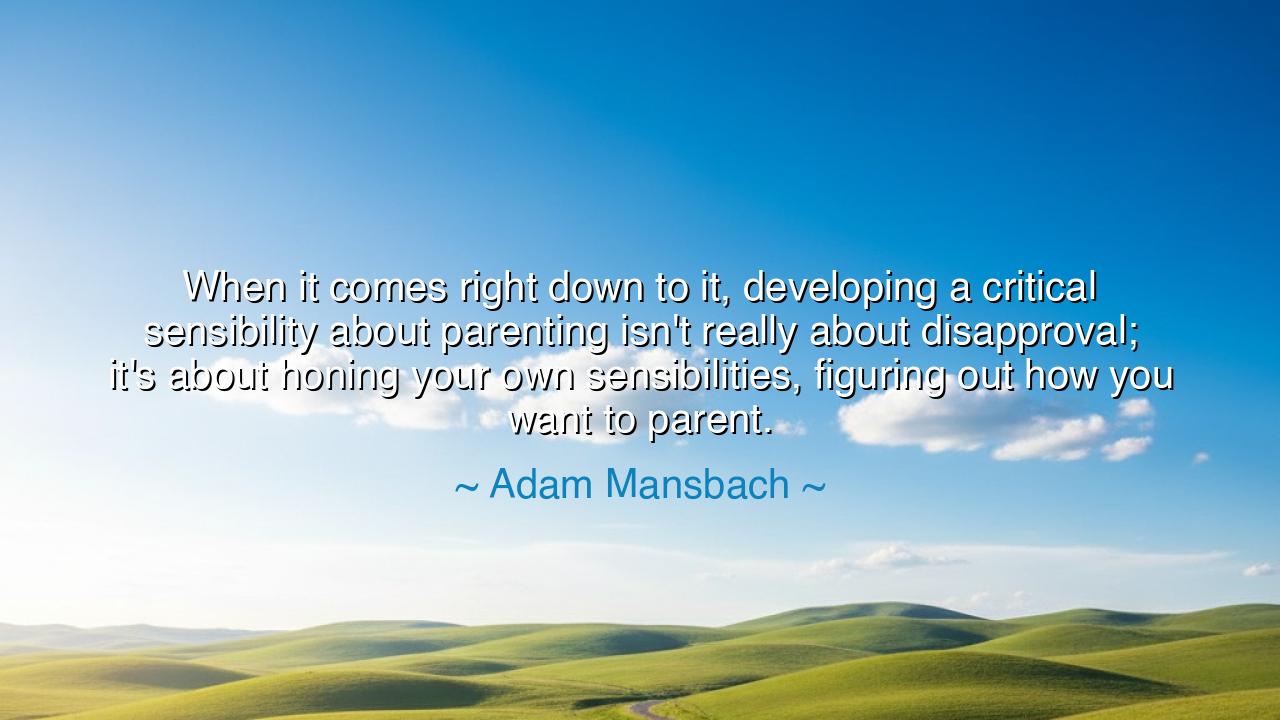
When it comes right down to it, developing a critical
When it comes right down to it, developing a critical sensibility about parenting isn't really about disapproval; it's about honing your own sensibilities, figuring out how you want to parent.






Hearken, O seekers of wisdom, to the reflective words of Adam Mansbach, who reveals that the cultivation of a critical sensibility about parenting is not an exercise in judgment of others, but a journey inward, a quest to understand one’s own principles, values, and intentions. He teaches that the scrutiny of childrearing is not rooted in disapproval, but in the refinement of the parent’s own sensibilities, in discerning how one wishes to guide, nurture, and shape the young. In this, we perceive an ancient truth: self-knowledge is the cornerstone of all virtuous guardianship.
The origin of this insight lies in the timeless tension between observation and action. Across generations, philosophers and sages have counseled that the evaluation of others must begin with the evaluation of the self. Confucius, in his teachings on virtue and filial duty, emphasized the necessity of reflection before reproach, asserting that one’s own conduct must be aligned with moral understanding before one can guide another. Mansbach modernizes this wisdom, directing it toward parenting, reminding us that understanding how one wishes to parent is as crucial as any external standard or societal expectation.
Consider the life of Jane Addams, the famed social reformer, who worked tirelessly to improve the lives of children and families in the settlement houses of Chicago. She studied the conditions of others not to cast judgment, but to refine her own methods of nurturing and instruction, cultivating programs that reflected her values and vision of care. Addams’ work exemplifies Mansbach’s principle: critical observation becomes a tool for personal clarity and intentional action, rather than condemnation or superiority.
The emotional resonance of Mansbach’s insight is profound. Parenting is inherently complex, fraught with doubt, expectation, and societal pressures. To develop a critical sensibility is to confront these pressures with courage and reflection, allowing them to illuminate one’s own priorities and approach. The aim is not perfection, nor is it to measure oneself against others; it is to craft a parenting philosophy rooted in authenticity, empathy, and deliberate choice.
In practical terms, this philosophy demands active reflection and mindful engagement. One must observe not only external models of parenting but also one’s own instincts, reactions, and values. Journaling, discussion with trusted peers, and contemplation of moral and practical principles can cultivate this critical sensibility, allowing the parent to identify which practices resonate with their vision of nurturing and which may be discarded or adapted. Historical examples, from Aristotle’s teachings on virtue ethics to contemporary child development programs, reveal that intentional reflection transforms observation into wisdom.
Mansbach’s insight also carries a heroic dimension: the courage to confront uncertainty, to question inherited methods, and to define one’s own approach. Parenting is not a passive inheritance of tradition, but an active creation of values, behaviors, and relational patterns. The development of a critical sensibility equips the parent to navigate challenges with discernment, ensuring that their guidance is neither imposed blindly nor absent in the face of complexity.
From this understanding arises a practical lesson: cultivate self-reflection as the foundation of your parenting philosophy. Observe others not to judge, but to inform your own choices. Hone your instincts, align your actions with your values, and deliberate on the type of guidance you wish to offer. Let each decision be intentional, rooted in empathy, awareness, and a desire to foster resilience, curiosity, and virtue in the young.
Thus, the teaching of Adam Mansbach endures: developing a critical sensibility in parenting is a path of self-knowledge and deliberate choice, not condemnation of others. Let all who bear this sacred responsibility approach it with humility, reflection, and courage, crafting an approach that is authentic, thoughtful, and attuned to the flourishing of their children. In this way, parenting becomes not a trial imposed by expectation, but a heroic journey of moral clarity, love, and enduring guidance.






AAdministratorAdministrator
Welcome, honored guests. Please leave a comment, we will respond soon